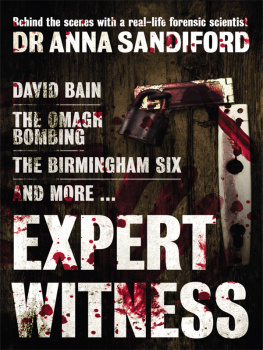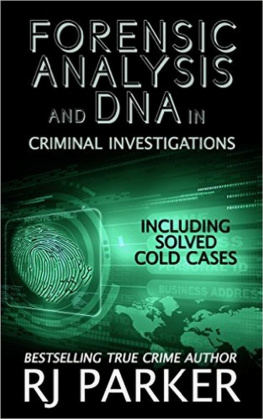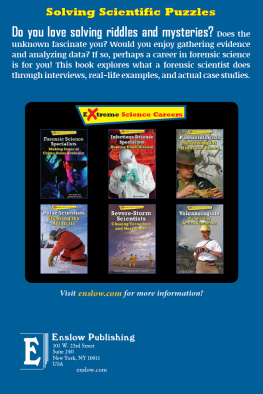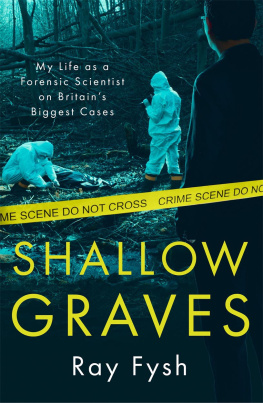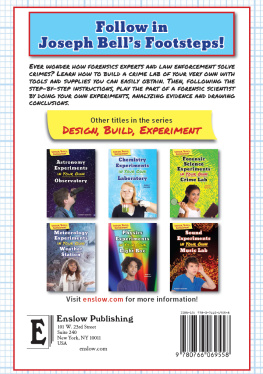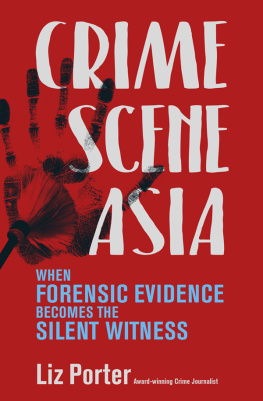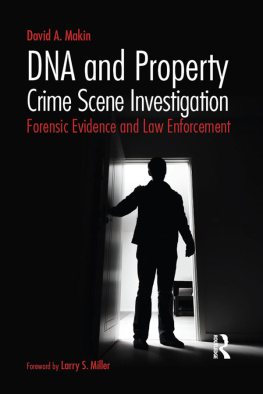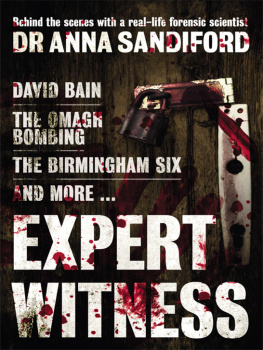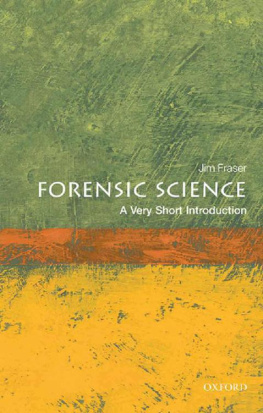Dr Anna Sandiford is an independent forensic science consultant. She provides advice on forensic science for a wide range of clients, including barristers and solicitors, insurance companies, private investigators, private clients, police forces and intelligence agencies. As an expert witness, she has an overriding duty to assist the Court impartially on relevant matters within her areas of expertise.
Dr Sandiford has worked in forensic science since 1998 and has been involved with cases throughout New Zealand, the UK and, on occasion, the Channel Islands and the Cayman Islands. She is director of The Forensic Group, a forensic science consultancy based in Auckland.
T his book is about my job and the casework in which I have been involved. I didnt plan on this being my job, but thats the way its turned out. Being a forensic scientist is a very serious matter and is taken very seriously in day-to-day life. What forensic scientists do has a direct impact on people, which will affect those people and those around them for the rest of their lives. This is the aspect of the job with which most people are familiar because of media portrayal, television dramas and such like.
However, as in any job, there is a certain degree of monotony that comes with spending hours being stuck in traffic jams and dealing with bureaucracy. At the other end of the spectrum are the amusing things that come out of investigating death, destruction and general law-breaking (it is a well-known phenomenon that people who face the most traumatic situations every day manage such difficult circumstances by trying to make light of them and finding things funny; its human nature and a safety mechanism). The humdrum and the amusement are the aspects people dont consider about forensic scientists jobs, but theyre the things that help us remain sane and functional.
Im hoping this book will provide an indication of how forensic science is applied in a practical sense and give you an idea of what the job actually entails. With the exception of the David Bain case (which is pretty much public property these days), I have blurred the facts slightly or changed details (or just been thwarted in providing exact detail due to some of these things happening so long ago) so that the people and cases I write about can remain anonymous. While some people may think they recognise cases or situations, rest assured, every attempt has been made to prevent this happening.
My purpose in providing case examples is to demonstrate how the forensic science was applied or what happened in a situation, not to point fingers at particular criminals, lawyers or other individuals. The case examples are purely illustrative. I also refer to forensic scientists as expert witnesses or just experts. In this book, these terms are interchangeable.
When Im not writing books or blog posts, I work as an independent forensic scientist and researcher. As far as qualifications go, I hold a Bachelor of Science (Honours) degree in Geology and a Master of Science in Micro palaeontology (micro fossils), both from the University of Southampton, England. I also hold the degree of Doctor of Philosophy in Geology and Palynology (pollen analysis) and a Postgraduate Certificate of Proficiency in Forensic Science, both from the University of Auckland. Some people would say that eight years as a student is far too many, but it just took me a while to find out what I wanted to do with my life.
I am Director of The Forensic Group, a company which aims to be New Zealands most comprehensive independent forensic science consultancy. I am accredited with The Academy of Experts, a United Kingdom-based international accreditation organisation, and I am a Professional Member of both the Royal Society of New Zealand and the United Kingdom Forensic Science Society. I am also Secretary of the New Zealand Independent Forensic Practitioners Institute. All these memberships mean I am governed by several codes of conduct and ethics and that I am required to be impartial in my work.
I have been involved with forensic science since 1998, and until 2002 I was a forensic science consultant in New Zealand. Between 2002 and June 2008 I was employed first as a forensic science consultant, then subsequently a senior forensic science consultant and ultimately practice manager with a forensic science consulting company in England. As part of those roles I prepared more than one thousand reports on a variety of evidence types, largely for the defence but also for the prosecution. I also peer-reviewed and assessed a further one thousand-plus reports in a wide variety of forensic scientific fields.
A significant part of my role over the past 10-plus years has been the review of other scientists files as a peer-reviewer for accreditation purposes and as an expert appointed by either the Crown or the defence. I have reviewed dozens of files from ESR in New Zealand, all of the laboratories of the Forensic Science Service and LGC Forensics, the two main service providers in England and Wales, as well as casefiles from independent laboratories in England and Wales plus police forensic science laboratories in Scotland, the Channel Islands and the Cayman Islands.
One of my roles as a senior forensic science consultant is coordination and management of cases involving more than one evidence type. I review the scientific evidence, liaise with experts, manage the disclosure documents, organise the logistics of examination and re-examination of items and samples, arrange testing, organise Legal Aid funding and manage the general progress of the work until completion.
I have given evidence in court on more occasions that I can remember, but not as many times as I have actually been asked to attend court, but theres more about that in later pages. I regularly provide scientific advice to police forces, particularly in the United Kingdom.
In my capacity as a research scientist, I have published papers in national and international independently peer-reviewed scientific journals and I was a reviewer for the international scientific publication, Journal of Forensic Sciences. I am actively involved in forensic science research in conjunction with the School of Environment, University of Auckland, where I hold the position of Honorary Research Associate. I have lectured at the University of Auckland and at Anglia Ruskin University, Cambridge, England, in science and forensic science. I have also given science and forensic science presentations at various national and international scientific and non-scientific conferences and also at the England and Wales police Drink Drive conference. I spend quite a lot of time speaking to non-scientific groups including professionals, schools and general interest groups. You may have noticed that I keep referring to England and Wales instead of just writing the United Kingdom. The reason is because the laws that govern England and Wales are different from those in Scotland; the Scottish dont use non-Scottish experts unless absolutely necessary, such as in cases involving drug traces on bank notes because theres no one else who can do that sort of work. Ireland (Northern and Republic) also works in different ways with different police forces and different approaches. While it may seem cumbersome to write England and Wales, it is more accurate and, as a scientist, accuracy rocks!
As an expert witness I under stand that my overriding obligation is to the court and not to those instructing me. This means I wont say some thing in court that isnt true to the best of my knowledge and belief.

